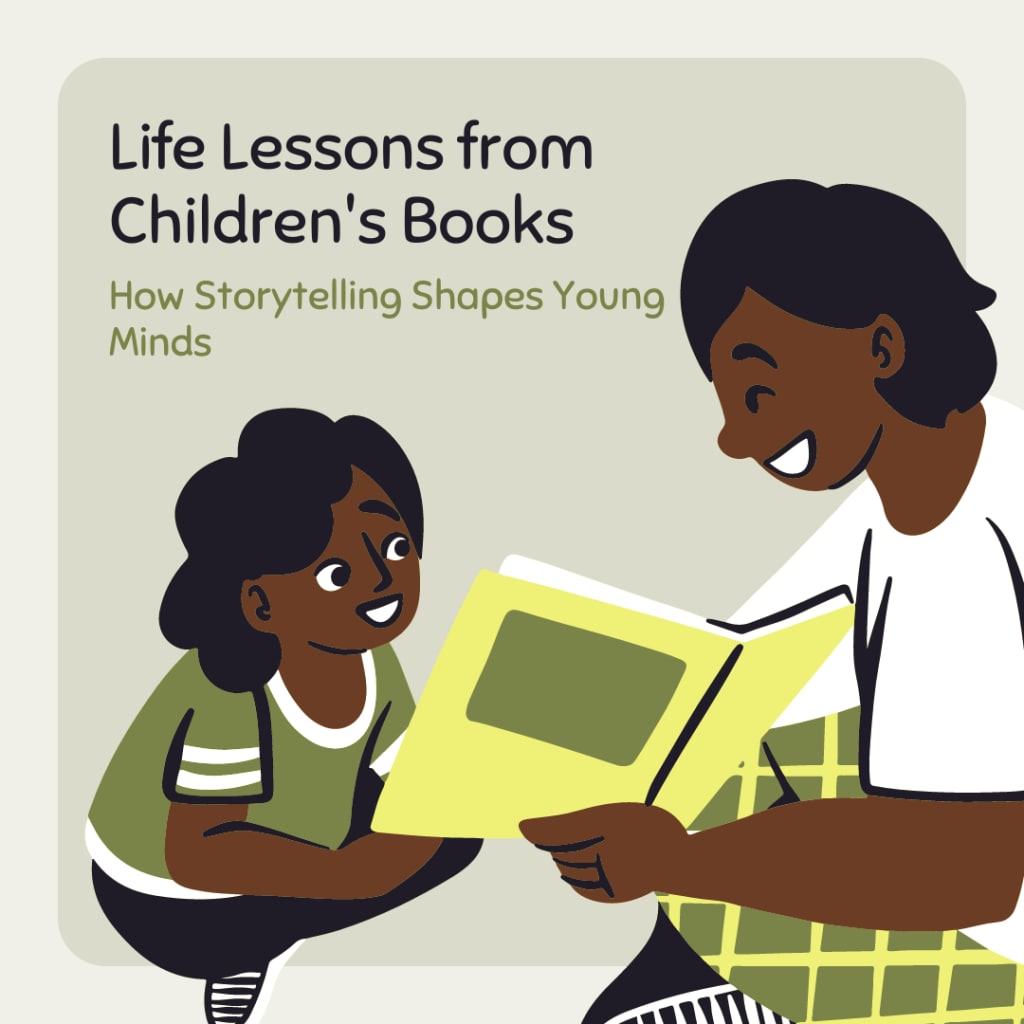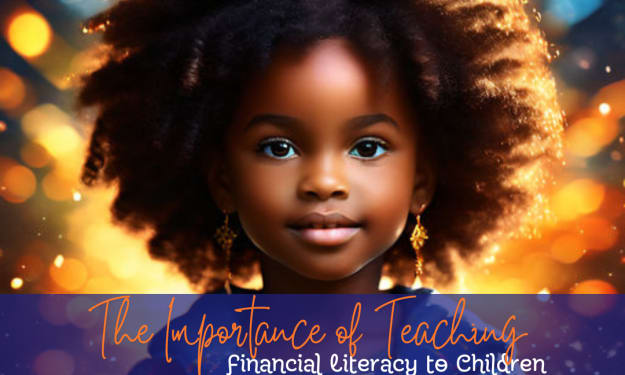Life Lessons from Children's Books
How Storytelling Shapes Young Minds

As a mother, wife, author of children's picture books and a retirement plan consultant, I've always been deeply passionate about the power of storytelling. Children's books are more than just tales of whimsical adventures and colorful illustrations; they are potent tools for teaching valuable life lessons that shape young minds. These lessons can profoundly impact children's development, equipping them with critical skills for their future roles as employees, business owners, service providers, and entrepreneurs. Let's explore the valuable lessons children can learn from stories, how these lessons contribute to their overall development, and the benefits for us as parents.
The Power of Storytelling
Storytelling has been a cornerstone of human culture for centuries, serving as a medium for passing down knowledge, values, and traditions. For children, stories are a gateway to understanding the world around them. Through the characters, plots, and settings in children's books, kids learn about empathy, resilience, problem-solving, and much more.
Lessons Learned from Children's Books
- Empathy and Compassion: Children's books often feature characters facing various challenges, allowing young readers to experience different perspectives. Stories like Charlotte's Web by E.B. White teach children about friendship, loyalty, and compassion. By identifying with characters, children learn to understand and empathize with others, fostering emotional intelligence.
- Resilience and Perseverance: Many stories involve characters overcoming obstacles, teaching children the importance of resilience. Books like The Little Engine That Could by Watty Piper inspire children to keep trying, even when the going gets tough. This lesson in perseverance is crucial for personal growth and future success.
- Problem-Solving and Critical Thinking: Stories often present characters with problems that need solving. Books like Harold and the Purple Crayon by Crockett Johnson encourage creative thinking and problem-solving skills. These lessons help children approach challenges with confidence and ingenuity.
- Moral and Ethical Understanding: Children's books frequently convey moral lessons, helping kids differentiate between right and wrong. Stories like The Lorax by Dr. Seuss teach children about environmental stewardship and the consequences of their actions. Understanding ethics from a young age lays the foundation for responsible behavior in adulthood.
Impact on Development
The lessons learned from children's books play a significant role in a child's cognitive, emotional, and social development. Let's delve deeper into how these lessons impact their future roles in society.
- Future Employees: Children who grow up reading stories that emphasize empathy and teamwork are more likely to become compassionate and collaborative employees. They understand the value of working well with others, which is essential in any professional setting. Additionally, problem-solving skills gained from stories help them navigate workplace challenges effectively.
- Future Business Owners and Entrepreneurs: Entrepreneurship requires creativity, resilience, and the ability to think outside the box—skills that are often nurtured through storytelling. Stories of characters who create, innovate, and persevere can inspire children to pursue entrepreneurial endeavors. Books like The Most Magnificent Thing by Ashley Spires encourage young readers to embrace creativity and persistence, crucial traits for any aspiring entrepreneur.
- Future Service Providers: Service providers, such as doctors, teachers, and social workers, benefit greatly from the empathy and compassion nurtured by stories. Understanding different perspectives and emotions is vital in these roles. Children's books that emphasize helping others and making a difference prepare kids for these impactful careers.
- Critical Thinkers and Problem Solvers: Regardless of the career path they choose, all children benefit from the critical thinking and problem-solving skills developed through storytelling. These skills are essential for making informed decisions, whether in personal or professional life. Stories that present challenges and encourage creative solutions help children become adept problem solvers.
Benefits for Parents
As parents, we often get caught up in the daily grind, juggling work, household responsibilities, and the needs of our children. It's easy to forget that we, too, once had dreams and aspirations. Sharing stories with our children can be a powerful reminder of those dreams and an opportunity to reconnect with our own creativity and imagination.
- Quality Time and Bonding: Reading stories to our children creates precious moments of bonding. It allows us to step away from our busy routines and engage in meaningful, shared experiences. These moments strengthen our relationships with our children and provide a sense of fulfillment and joy.
- Rekindling Our Dreams: Children's books often remind us of the dreams and aspirations we had when we were younger. They reignite our sense of wonder and possibility. As we read stories about adventure, courage, and creativity, we may find inspiration to pursue our own passions and goals.
- Modeling Lifelong Learning: By reading to our children, we model the importance of lifelong learning and curiosity. We demonstrate that learning doesn't stop with adulthood and that stories have the power to teach and inspire at any age. This sets a positive example for our children and encourages them to be lifelong learners.
Personal Experience - The Struggle and the Joy
As a busy mother and professional, I understand the struggle to find the time and energy to read stories to my children. There are days when all I want to do is lie down and be left alone to recharge. But I've found that even a short story before bed can make a significant difference.
One evening, after a particularly exhausting and stressful day, my youngest asked me to read Skin Like Me. Despite my fatigue, I agreed. As we journeyed through the story, I saw the joy and fascination in my child's eyes and was reminded why I started writing children's books.
It also reminded me of the magic of storytelling and the valuable lessons embedded in these tales. That night, I was reminded of my own dreams and the importance of nurturing them, just as I nurture my children's dreams through stories.
Practical Tips for Busy Parents
Here are some practical tips for incorporating storytelling into your busy routine:
Set a Routine: Dedicate a specific time each day for reading, such as bedtime. This creates a habit and ensures that storytelling becomes a regular part of your child's day.
Keep it Short and Sweet: Even short stories can have a big impact. Choose books that can be read in a few minutes if time is limited.
Rotate Books: Keep a variety of books on hand to maintain your child's interest. Rotate them regularly to introduce new lessons and adventures.
Involve Your Child: Let your child choose the book. This increases their engagement and excitement about storytime.
Be Present: Make storytime a screen-free, distraction-free moment. Fully engage with your child and the story to maximize the bonding experience.
Conclusion
Children's books are powerful tools for teaching valuable life lessons that shape young minds. Through stories, children learn empathy, resilience, problem-solving, and ethical understanding—skills that are crucial for their development and future success. As parents, sharing these stories with our children not only benefits them but also enriches our own lives. It reminds us of our dreams, strengthens our bonds, and models the joy of lifelong learning.
So, let's embrace the magic of storytelling. Let's turn everyday moments into opportunities for growth, imagination, and connection. By doing so, we nurture our children's potential and rediscover the wonder in our own lives.
Click on any of the titles below by Kay Johnson-Clennon to read more
- Riyah's Veggie Adventure: From Picky Eater to Super Strong
- The Day I Met A Dinosaur: The Arawak Adventure In Jamaica
- Binah's Brave Journey: From Chains to Freedom
- The Magic Book: Coping With Loss
- What If Money Grew on Trees
- A Light In This World
- Challenging Feelings In My Heart: A Kid's Guide To Prayer
- Positive Feelings In My Heart: A Kid's Guide To Prayer
- Skin Like Me
To purchase books by Kay Johnson-Clennon, click here.
About the Creator
Kay Johnson-Clennon
I’m a Wife | Mother | Author | Associate Actuary
Find out more here: https://linktr.ee/kaynijo
Enjoyed the story? Support the Creator.
Subscribe for free to receive all their stories in your feed. You could also pledge your support or give them a one-off tip, letting them know you appreciate their work.






Comments
There are no comments for this story
Be the first to respond and start the conversation.